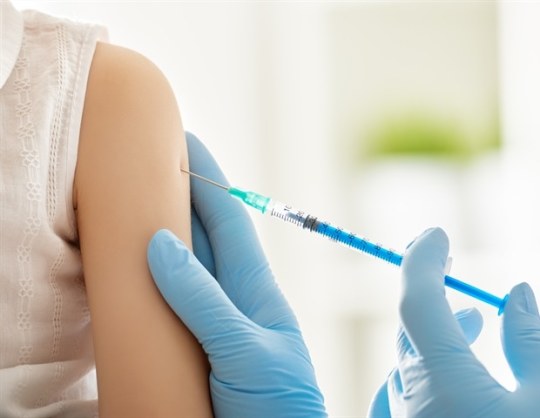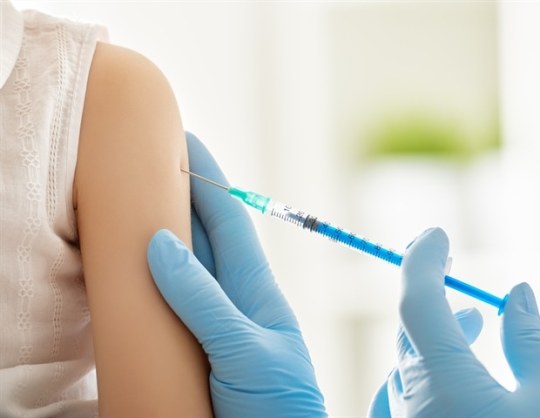#IDWeek
Explore tagged Tumblr posts
Text
Also preserved in our archive (Daily updates!)
by Katherine Kahn
Since early in the COVID-19 pandemic, epidemiologic studiesopens in a new tab or window demonstrated that household transmission was a key driver in the spread of SARS-CoV-2. However, nearly 5 years later, less is known about more nuanced dynamics of SARS-CoV-2 viral transmission in households, particularly in the setting of evolving variants and pre-existing immunity.
Two studies presented at this year's IDWeek annual meetingopens in a new tab or window focused on leveraging genomic analysis to gain a better understanding of whether COVID infections in households represent transmission between household members or the introduction of new infections.
Household density, vaccine status of exposed household members, and individual immunologic factors are all associated with the spread of SARS-CoV-2 among households, said Kathryn Stephenson, MD, MPH, of Harvard Medical School in Boston, during a presentation.
During the Alpha wave, the secondary attack rate for household contacts -- the risk of transmission of SARS-CoV-2 stemming from a household index infection -- was about 36%, dropping to approximately 30% during the Delta wave, but then rising to about 43% during the early Omicron period, as reported in a systematic review and meta-analysisopens in a new tab or window.
Stephenson and her colleagues conducted a small prospective study in the greater Boston area during 2022, enrolling 38 households with a positive SARS-CoV-2 index case, identified on either rapid diagnostic testing or PCR testing.
Over the next 2 weeks after enrollment, 58% of 38 households had a second case develop among household contacts, and, overall, 39% of 66 household contacts tested positive over that time period.
However, in a strict subanalysis in which researchers excluded index cases that were PCR-negative on day 1 or contacts that tested positive on day 1, the secondary attack rate fell to 22.5%.
Furthermore, after performing genomic analysis to identify SARS-CoV-2 lineages with different genetic makeup that could not be caused by infection from the index case, that percentage dropped to 18.4%.
The finding indicated that although the most common source of infection was the index case, there were multiple sources of infection in over half of individual households, Stephenson said. Other sources for those infections likely included new cases introduced from outside the household, shared initial exposures with the index case, and other already infected contacts within the home.
In the larger, ongoing prospective CASCADIA studyopens in a new tab or window, Amanda Casto, MD, PhD, of the University of Washington in Seattle, and colleagues also used genomic analysis to look at the frequency of simultaneous circulation of multiple viral strains in households.
The investigators analyzed genetic data from weekly nasal swabs from children and adults ages 6 to 49 years in households in Seattle and Portland, Oregon between 2022 and 2024.
Of 1,103 households, 67% had at least one SARS-CoV-2 case, and 24% of households had at least one episode in which two or more participants tested positive. Of these, 7% of episodes involved more than one viral lineage, suggesting multiple introduction events.
"Before the widespread availability of viral genome sequence data, chronologically clustered cases in households were often presumed to be all secondary to intra-household transmission," Casto commented. "Now that genetic data are being integrated into a number of epidemiologic studies, there have been a number of observations of the simultaneous circulation of multiple viral lineages in households within a short time."
Of note, Casto and her colleagues found no association with certain household characteristics, including number of children or people in the household, or household income, which were associated with intra-household transmission.
When more than one viral lineage was present, the investigators also found no association with the presence of any children or children under 5 years of age in the household or with children attending daycare. Nor was there any association with location (i.e., households in Oregon vs Washington), any previous household illness episodes, or households living in apartments versus single-family homes.
What can we take away from these two studies? Household contacts of a person newly diagnosed with COVID-19 are certainly at high risk for SARS-CoV-2 infection in the following weeks. However, this may not only be due to heightened risk of transmission between household members, but also -- perhaps not so surprisingly -- to an overall increase in SARS-CoV-2 transmission in the community where different strains may be circulating.
In other words, "infection within the household can serve as a proxy for broader risk for community transmission, emphasizing importance of public health measures inside and outside the home," Stephenson said.
Casto noted that "in the long run, [genomic data] will really help us refine our understanding of the conditions under which intra-household transmission of respiratory viruses occurs and does not occur."
Studies: jamanetwork.com/journals/jamanetworkopen/article-abstract/2774102 jamanetwork.com/journals/jamanetworkopen/fullarticle/2791601 bmjopen.bmj.com/content/13/7/e071446.long
#mask up#covid#pandemic#public health#wear a mask#covid 19#wear a respirator#still coviding#coronavirus#sars cov 2
25 notes
·
View notes
Text
Alarming Racial Discrepancies In Vaccine Uptake
Fewer than half of people in a study received vaccines against RSV, COVID-19 or influenza.
Race and socioeconomic conditions significantly affect the vaccine uptake.
Researchers presented data at IDWeek showing that socioeconomic vulnerability and race can negatively impact vaccine uptake.
“One of the study’s most interesting findings is that racial differences in vaccination rates persisted even when we considered factors like income, health insurance and neighborhood,” Elie Saade, MD, MPH, FIDSA, associated professor of medicine at Case Western Reserve University, said during a press briefing ahead of the conference. “This shows that addressing access issues isn’t enough.”
0 notes
Text
Krypto bäst idag, blandad stängning med “Crypto top 10” och AstraZeneca överst
Stockholmsbörsen stängde kring nollan med låga handelsvolymer. Guldet var återigen upp på rekordnivåer och toppade på 2684 kr under dagen. Crypto top 10 (+4,36%) stängde bäst i laguppställningen och bästa aktie blev AstraZeneca (+1,98%) som ska presentera nya data från sin portfölj inom vaccin- och immunterapier vid den årliga konferensen IDweek i Los Angeles. På tredje plats kom etf:en som…
0 notes
Text
Acurx Pharmaceuticals Presents Abstract and Poster Presentation at IDWeek: New Microbiome Data from Its Phase 2a Clinical Trial of Ibezapolstat for C. difficile Infections
Acurx Pharmaceuticals Presents Abstract and Poster Presentation at IDWeek: New Microbiome Data from Its Phase 2a Clinical Trial of Ibezapolstat for C. difficile Infections
Acurx Pharmaceuticals, Inc. a clinical stage biopharmaceutical company developing a new class of antibiotics for difficult-to-treat bacterial infections, announced today that a scientific abstract and poster presentation will be given at the Infectious Disease Society of America (IDSA) IDWeekTM 2021, taking place virtually from September 29 – October 3, 2021: Title: An Open-label Phase 2a study…

View On WordPress
#Acurx Pharmaceuticals#Are there any C. diff. clinical studies?#Are there C. difficile clinical trials?#bezapolstat#Clostridioides difficile clinical trials#Gram-positive Selective Spectrum#IDWeek#Professor Kevin Garey PharmD MS#University of Houston
0 notes
Text
Merck to present new data from its extensive infectious diseases and vaccines pipeline and portfolio during IDWeek 2020
Merck to present new data from its extensive infectious diseases and vaccines pipeline and portfolio during IDWeek 2020

Data from More Than 50 Clinical and Epidemiological Abstracts Across Vaccines, HIV, Antibiotics and Antimicrobials Show the Breadth of the Company’s Commitment to Addressing the Threat of Infectious Diseases
KENILWORTH, N.J.–(BUSINESS WIRE)–$MRK #MRK–Merck (NYSE: MRK), known as MSD outside the United States and Canada, announced today that new clinical and epidemiological data from its broad…
View On WordPress
0 notes
Text
2019 in review
Yes I’m ALIVE, I’m BACK after several months of being buried in research, applications, and whatnot. So by tradition, it’s time for my annual review!
1 - What did you do in 2019 that you’d never done before?
Apply for a masters program, take a spin class (guys. It was...weird.), finish my first year of fellowship, go to IDWeek, bake a ton of new recipes 2 - Did you keep your new years’ resolutions, and will you make more for next year?
I kept my resolution for packing lunch 3-4 times a week!
I will definitely make more resolutions for the upcoming year, including hitting 5000 steps a day or more for 5 out of 7 days.
3 - Did anyone close to you give birth?
No but next year I have like three close friends who will be giving birth
4 - Did anyone close to you die?
Yes, my grandma :(
5 - What countries did you visit?
Hong Kong, a couple parts of China
6 - What would you like to have in 2020 that you lacked in 2019?
Improved confidence and skill in infectious diseases (I said it last year but I’m saying it again) and I’m adding infection control to that. More confidence in my intuition, more time to care for myself 7 - What date from 2019 will remain etched upon your memory, and why?
4/17/2019. The day I delivered my big fellowship presentation and immediately got on a Lyft to go to the airport to get on a plane for my grandmother’s funeral. The fact that I was forced to stay an extra week to do this presentation is something I’m never really going to be okay with.
8 - What was your biggest achievement of the year?
Completing a 6 week biostats bootcamp over the summer
9 - What was your biggest failure?
Not putting my foot down sooner when I had concerns about my research project, which resulted in a several month delay and drag on getting things going 10 - Did you suffer illness or injury?
Little things, like the flu but otherwise I was okay! 11 - What was the best thing you bought?
My new MVMT watch. It’s professional, classy, and a little rock n roll. Just my style. 12 - Whose behavior merited celebration?
The female leadership in academic ID. I heard and went to some phenomenal talks by women in academic ID. It was, at most times, hard to hear about the things they’ve endured. But also educational and inspiring. 13 - Whose behavior made you appalled or depressed?
ANTI-VAXXERS
14 - Where did most of your money go?
Plane tickets and rent
15 - What did you get really, really, really excited about?
The Witcher, His Dark Materials, the Game of Thrones finale, the NADDPOD live show I went to, IDWeek, the cookbooks I bought, the finale of TAZ: Amnesty 16 - What song(s) will always remind you of 2019?
Marry Me--Betty Who 17 - Compared to this time last year, are you: I. Happier or sadder?
Happier. II. Thinner or fatter?
Thinner, by 15 pounds!
III. Richer or poorer?
Richer.
18 - What do you wish you’d done more of?
Take time for mindfulness and centering myself. 19 - What do you wish you’d done less of?
Let my anxiety and imposter syndrome overrule my judgement 20 - How will you be spending/spent Christmas?
Watching Disney+, making food, napping
21 - Did you fall in love in 2019?
Nah 22 - How many one-night stands?
Zero. 23 - What was your favorite tv program?
The Great British Bake Off, probably. If only gauged by the sheer number of times I watched all the seasons and spin-offs
24 - Do you hate anyone now that you didn’t hate this time last year?
Yeah, that’s natural. Of course. 25 - What was the best book you read?
Guys. Guys. Gideon the Ninth. Go read it. Go read it NOW. I STILL THINK ABOUT IT. Slow burn romance between space lesbian necromancers exploring an ancient, kinda-abandoned palace. GO GO GO. So that I can cry with someone about it. 26 - What was your greatest musical discovery?
The Band Camino. 27 - What did you want and get?
To save money, explore my new surroundings, lose weight that was making me feel physically exhausted and sick 28 - What was your favorite film of this year?
The Farewell.
29 - What did you do on your birthday, and how old were you?
31. I did biostats and epi homework. No joke. 30 - What one thing would have made your year immeasurably more satisfying?
Less negative self talk
31 - How would you describe your personal fashion concept in 2019?
Office wear with punk and rock details 32 - What kept you sane?
MBMBaM podcasts, GBBO episodes 33 - Which celebrity/public figure did you fancy the most?
Keanu Reeves. Listen, I’ve loved him since I was twelve years old. I still love him.
34 - What political/social issue stirred you the most?
Healthcare access in the corrections system, anti-vaccination, women in medicine 35 - Who did you miss?
My grandma and my best friend. 36 - Who was the best new person you met?
The new associate hospital epidemiologist
37 - Tell us a valuable life lesson you learned in 2019:
I can trust in myself.
34 notes
·
View notes
Link
A leading infectious disease physician in New York City has advocated a shared decision-making model for helping guide people at risk of contracting HIV as they consider taking pre-exposure prophylaxis (PrEP) or switching one form of PrEP for another, Medscape reports.
Oni Blackstock, MD, founder and executive director of Health Justice and an attending physician in the division of infectious diseases at Harlem Hospital in New York, made her case for this model of PrEP-related health care at the recent virtual IDWeek conference.
1 note
·
View note
Text
Hotel Booking in Budget for ID week Conference 2017
Join the biggest Infectious Diseases Week 2017 at October 4 to 8 October 2017, more than 7000 Delegates are come to attend this conference and share knowledge or updates new technology. Many professionals like: doctors, patients, scientists and researchers are come to join this Id Week conference 2017. Congress Makers will help you to book all best facilities like: Hotel Booking, Transport and city tour.

#id week 2017#id week#idweek#Infectious Diseases Week 2017#id week conference#Id week meetings 2017#id week conference 2017#id week San Diego
0 notes
Text
Der Hepatitis-B-Impfstoff mit drei Dosen schützt Erwachsene, die mit HIV leben, vollständig
Der Hepatitis-B-Impfstoff mit drei Dosen schützt Erwachsene, die mit HIV leben, vollständig
Laut den heute auf der IDWeek-Konferenz in Washington, DC, vorgestellten Studienergebnissen schützte eine Drei-Dosen-Kur des Hepatitis-B-Impfstoffs HEPLISAV-B Erwachsene mit HIV, die noch nie gegen das Hepatitis-B-Virus (HBV) geimpft oder damit infiziert waren, vollständig Das National Institute of Allergy and Infectious Diseases (NIAID), Teil der National Institutes of Health, sponsert die…

View On WordPress
0 notes
Text
Three-dose regimen of HEPLISAV-B vaccine fully protects people living with HIV, data shows
Three-dose regimen of HEPLISAV-B vaccine fully protects people living with HIV, data shows
The AIDS Clinical Trials Group (ACTG), the world’s largest HIV research network whose focus has expanded to include evaluating outpatient treatment for COVID-19, today presented a session demonstrating that a three-dose regimen of the HEPLISAV-B vaccine fully protected people living with HIV at IDWeek 2022, taking place in Washington D.C. from October 19-22, 2022. Hepatitis B is a serious liver…

View On WordPress
0 notes
Text
Seres Therapeutics Announced Data From Its Phase 3 ECOSPOR III Study Evaluating SER-109, An Investigational Oral Microbiome Therapy For Recurrent C. diff. (C. difficile) Infection
Seres Therapeutics Announced Data From Its Phase 3 ECOSPOR III Study Evaluating SER-109, An Investigational Oral Microbiome Therapy For Recurrent C. diff. (C. difficile) Infection
Seres Therapeutics, Inc. a leading microbiome therapeutics company, today announced data from its Phase 3 ECOSPOR III study evaluating SER-109, an investigational oral microbiome therapy for recurrent C. difficile infection (rCDI), will be presented at the IDWeek 2021 Virtual Conference (Sept. 29-Oct. 3). The Company will be presenting seven posters and oral presentations related to SER-109 and…

View On WordPress
#CDI and recurrence#Clostridioides difficile clinical trials#IDWeek#Investigational Microbiome Drug to Reduce Recurrence After Clostridioides difficile Infection#SER-109#Seres Therapeutics SER-109
0 notes
Text
Der Hepatitis-B-Impfstoff mit drei Dosen schützt Erwachsene, die mit HIV leben, vollständig Laut den heute auf der IDWeek-Konferenz in Washington, DC, vorgestellten Studienergebnissen schützte eine Drei-Dosen-Kur des Hepatitis-B-Impfstoffs HEPLISAV-B Erwachsene mit HIV, die noch nie gegen das Hepatitis-B-Virus (HBV) geimpft oder damit infiziert waren, vollständig Das National Institute of Allergy and Infectious Diseases (NIAID), Teil der National Institutes of Health, sponsert die laufende klinische Phase-3-Studie ACTG A5379. HBV wird hauptsächlich durch sexuellen K... #Aids #Allergie #Antikörper #Antiretroviral #chronisch #CpG #Ermüdung #essen #Forschung #Gesundheit_und_menschliche_Dienste #HBV #Hepatitis #Hepatitis_B #Hepatitis_B_Virus #HIV #Impfung #Infektionskrankheiten #Klinische_Studie #Leber #Leber_erkrankung #Medizin #Medizinische_Forschung #Muskel #OKT #pH_Wert #Schmerzen #Virus
#DiseaseInfection_News#Drug_Trial_News#News#Aids#Allergie#Antikörper#Antiretroviral#chronisch#CpG#Ermüdung#essen#Forschung#Gesundheit_und_menschliche_Dienste#HBV#Hepatitis#Hepatitis_B#Hepatitis_B_Virus#HIV#Impfung#Infektionskrankheiten#Klinische_Studie#Leber#Leber_erkrankung#Medizin#Medizinische_Forschung#Muskel#OKT#pH_Wert#Schmerzen#Virus
0 notes
Text
Ferring Pharmaceuticals and Rebiotix, a Ferring Company, Announced Final Results of An Analysis From Five Prospective Trials Of Its Investigational Microbiota-Based Live Biotherapeutic RBX2660
Ferring Pharmaceuticals and Rebiotix, a Ferring Company, Announced Final Results of An Analysis From Five Prospective Trials Of Its Investigational Microbiota-Based Live Biotherapeutic RBX2660
Ferring Pharmaceuticals and Rebiotix, a Ferring Company, today announced final results of an analysis from five prospective trials of its investigational microbiota-based live biotherapeutic, RBX2660, for the reduction of recurrent C. difficile infection (rCDI). The abstract, presented at IDWeek 2021, represents the first time these data are showcased together, and is one of only four abstracts…

View On WordPress
#Are there any C. diff. clinical studies?#Are there C. difficile clinical trials?#Clostridioides difficile clinical trials#Ferring Pharmaceutical#IDWeek#Rebiotix a Ferring Company
0 notes